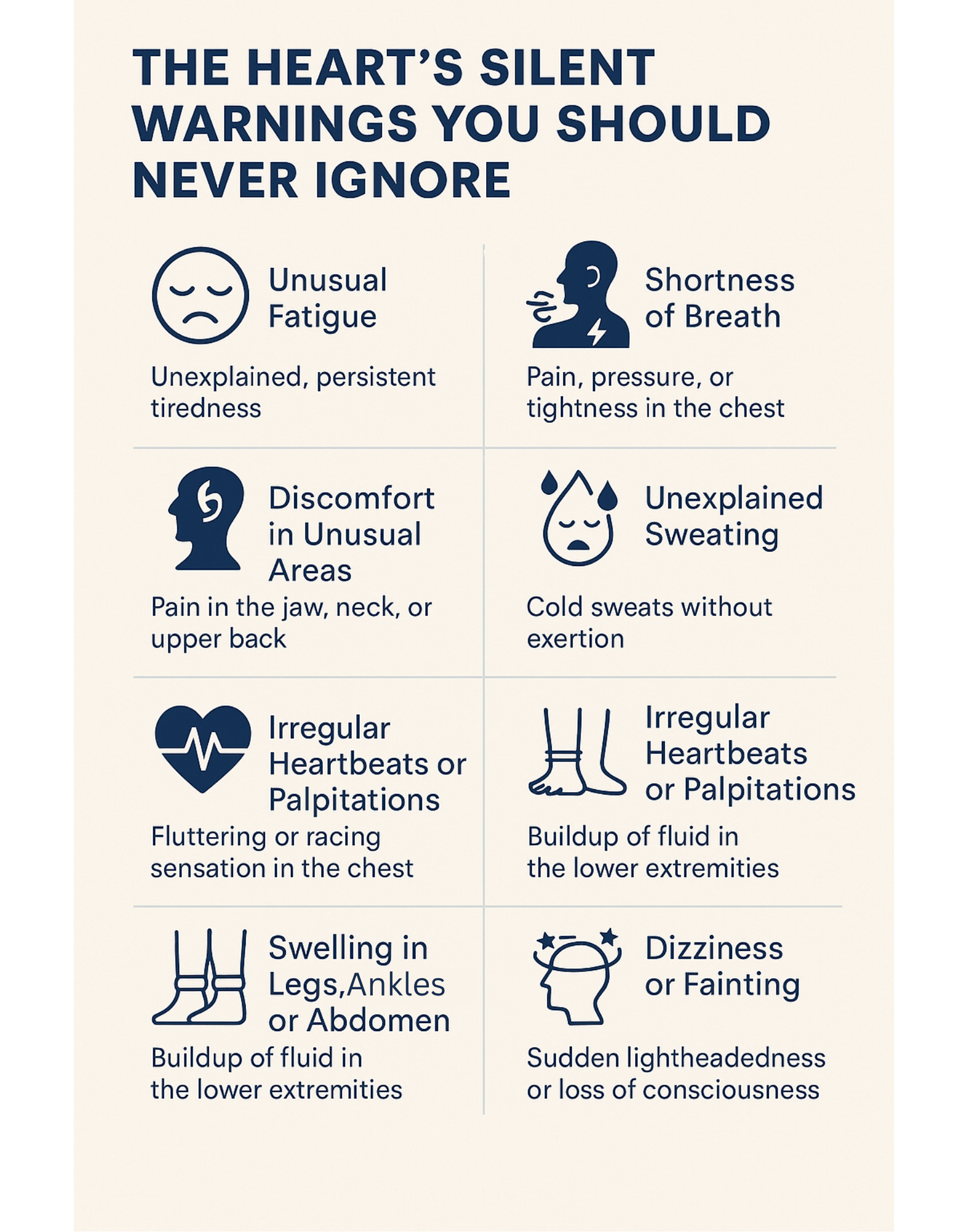The Heart’s Silent Warnings You Should Never Ignore

As a physician, I have seen countless patients walk into my clinic thinking their heart is perfectly fine, only to discover that it has been sending warning signals for weeks, months, or even years. The truth is, the heart is a remarkable organ — strong, tireless, and faithful — but it is not indestructible. When trouble begins, it often speaks in whispers, not shouts. These whispers can be subtle, easy to overlook, and tragically, sometimes ignored until it is too late.
Why the Heart Speaks Quietly
Your heart is designed to adapt and compensate for stress, pressure, or disease for as long as it can. This is why early heart disease often goes unnoticed. Only when the situation becomes serious do the symptoms become dramatic. But by then, damage may already be done. The earlier we recognise the signs, the greater our chance to prevent a heart attack, heart failure, or sudden cardiac death.
Symptoms That Deserve Immediate Attention
1. Unusual Fatigue
This is not the tiredness after a long day’s work — it’s a persistent lack of energy, even after rest. Many patients, especially women, report feeling unusually drained weeks before a heart attack. If you find yourself struggling with simple daily tasks without a clear reason, don’t dismiss it.
2. Shortness of Breath
If climbing a flight of stairs or walking a short distance leaves you unusually breathless, and this is new for you, it could indicate that your heart is struggling to pump efficiently. Shortness of breath at night, especially when lying flat, is another red flag.
3. Discomfort in the Chest
This is the most well-known symptom, but it is not always severe pain. It may feel like pressure, tightness, heaviness, or a squeezing sensation. Some people describe it as “an elephant sitting on my chest.” Importantly, not all chest pain is heart-related, but every episode should be evaluated promptly.
4. Discomfort in Unusual Areas
The heart’s warning signals are not limited to the chest. Pain or discomfort may appear in the jaw, neck, shoulders, upper back, or arms (especially the left). These symptoms often occur during activity and fade with rest — a pattern that must be investigated.
5. Unexplained Sweating
Breaking out into a cold sweat without obvious cause, especially if accompanied by discomfort or shortness of breath, can be a sign of an ongoing heart attack.
6. Irregular Heartbeats or Palpitations
Feeling your heart skip a beat, flutter, or race without reason should not be ignored — especially if it’s associated with dizziness, weakness, or chest discomfort. Some rhythm disturbances can be harmless, but others are dangerous and require urgent care.
7. Swelling in the Legs, Ankles, or Abdomen
This can indicate fluid buildup due to heart failure. Patients sometimes blame it on “age” or “heat,” but persistent swelling should be taken seriously.
8. Dizziness or Fainting
Temporary loss of consciousness or sudden dizziness can occur when the heart fails to supply enough blood to the brain. This is not a symptom to watch casually; it needs investigation.
Who Is at Higher Risk?
Anyone can develop heart disease, but certain factors increase the risk:
• Hypertension
• Diabetes
• High cholesterol
• Smoking
• Obesity
• Family history of early heart disease
• Sedentary lifestyle
If you fall into any of these categories, you must be extra vigilant about even the mildest symptoms.
When to Seek Medical Help Immediately
• Sudden onset of chest discomfort or pressure
• Shortness of breath that is new or worsening
• Unexplained fainting or near-fainting
• Palpitations with weakness, dizziness, or chest discomfort
• Sweating, nausea, or lightheadedness along with chest discomfort
In all these cases, do not drive yourself — call emergency services. Time lost is muscle lost.
Your heart’s silent warnings are its way of pleading for help before catastrophe strikes. Listening to them is not a sign of weakness; it is an act of wisdom. I have seen too many patients regret delaying their visit to the doctor. Don’t let yourself be one of them. The earlier we act, the better the outcome — and often, the treatment is simpler than you imagine.
Your heart has been working for you since before you were born. The least we can do is listen when it speaks.
Physician’s Advice Corner
Do you have questions about the topic ? Kindly share them in the comments below or email us at info@withinthebody.com or message us on WhatsApp at 0092 320 8708835.
If you like the article or our website, kindly share the link with your contacts.
Your health is your responsibility — but you don’t have to manage it alone. The right knowledge, at the right time, can save lives.